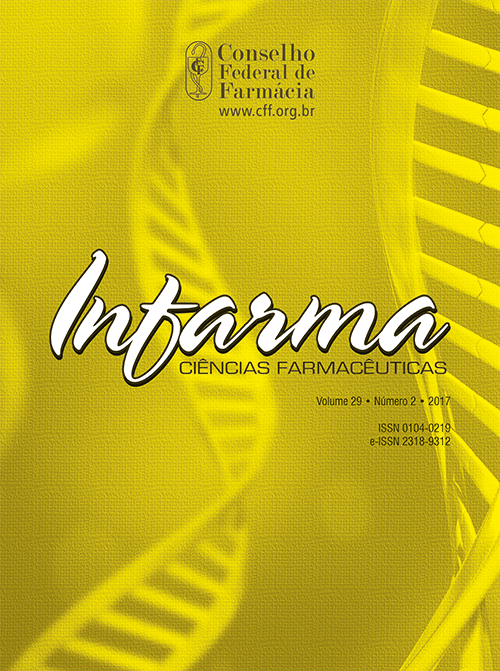PRESUMPTIVE DETECTION OF AFLATOXINS IN PEANUTS MARKETED IN RECIFE, PE, BRAZIL
DOI:
https://doi.org/10.14450/2318-9312.v29.e2.a2017.pp141-146Keywords:
aflatoxin, Aspergillus flavus, peanuts, thin layer chromatography.Abstract
Mycotoxins are natural contaminants difficult to control in food. It is estimated that about 25% of all agricultural products in the world are contaminated by these substances. Aflatoxin is the most known mycotoxin for its toxic effects in
humans and animals. Based on the risks to which the population is exposed, a study for the presumptive identification of the presence of aflatoxins in industrialized peanuts seeds, purchased at supermarkets, and in samples collected in Boa Viagem beach, in Recife, state of Pernambuco was conducted. Applying the thin layer chromatography technique (TLC), the presence of aflatoxin was detected in all six analyzed samples. Aflatoxin B was found in samples of processed peanuts, and in fresh samples. Regarding the G subtype, it was observed only in one of the roasted peanuts samples. The complete elimination of aflatoxins in food is virtually impossible to occur. Therefore, the appropriate precautions should be taken, seeking to reduce the maximum aflatoxin levels in human food and animal. In addition to government oversight, food industry and the all people should also help to ensure better food safety.
Downloads
Published
How to Cite
Issue
Section
License
Authors who publish in this journal agree to the following terms:
- Authors retain the copyright and grant the journal the right of first publication, with the work simultaneously licensed under the Licença Creative Commons Attribution which allows the sharing of work with acknowledgment of authorship and initial publication in this journal.
- Authors are authorized to take additional contracts separately, for non-exclusive distribution of the version of the work published in this journal (e.g. publish in institutional repository or as a book chapter), with acknowledgment of authorship and initial publication in this journal.
- Authors are allowed and encouraged to publish and distribute their work online (e.g. in institutional repositories or on their personal page) at any point before or during the editorial process, as this can generate productive changes as well as increase the impact and Citation of published work (See O Efeito do Acesso Livre ).


